Terrorism
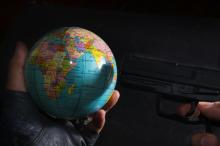
For the first week of Advent, my wife Amy preached about hope. She pointed out that having hope doesn’t mean necessarily that we see a way out of suffering. It does, however, give us a reason to try to keep working through it. We have to believe there’s another side to it. Another possibility. The potential for a new reality.
And that reality will never, ever be realized by responding to violence with more violence. It may make us feel better in the moment. It may seem to offer short-term relief. But ultimately, it makes everyone that participates become a little bit of what they hate. And the cycle continues.
Which story will we choose to try to live into?
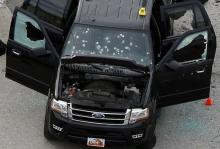
Tashfeen Malik, the female suspect in the San Bernardino shooting spree, had expressed support for the Islamic State terrorist group and its leader, Abu Bakr al-Baghdadi, in a social media post, according to two U.S. officials.
While there was no indication yet that the extremist group, also known as ISIL or ISIS, directed the massacre in California that left 14 people dead, the posting represents the strongest link yet that the killings may have been rooted, at least partially, in terrorism.
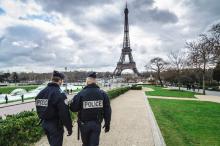
French authorities announced Dec. 2 that they shut down three radicalized mosques.
After the Nov. 13 attacks in Paris, the government proclaimed a state of emergency, which grants it wide latitude to conduct searches, make arrests, and ban public gatherings.

God’s been telling the story of restoration since Genesis when we were created selem Elohim, in the image of God. We were created into perfect communion with God. From Genesis 3 until the end of the Old Testament, we see a narrative of a people in exile and God giving opportunities for reconciliation and restoration of relationship that humanity is incapable of accepting. Reconciliation is an exchange of something worthless (our condition of sin) for something immeasurably worthy (communion with God).
In the New Testament we see a biblical narrative through Jesus of now-but-not-yet restoration. In Jesus we see the coming of the Kingdom of God and get to be reconciled back to God. We even get a glimpse of an eternity where there is no more death or mourning or crying or pain.
If we truly believe we are the image of God, it changes how we approach the image of God in the world. Our call then is to actively partner with God in taking the world somewhere.
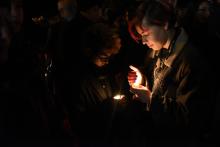
My son’s public school is amazing. The community is everything I had hoped it would be. There are several parent and grandparent volunteers who come in and out of the building daily to help in the classroom, playground and lunchroom. At first, I had wanted to make a big fuss about security and locking the front door during the school day. I thought that was going to be my platform, my soapbox. But after the crying incident, I decided that something in me had to change. I didn’t want to live in fear anymore. I didn’t want to let fear drive me. After some reflection, I had to shift that fear and move to a place of hope and love. Hope that this kind of violence would never touch my school community. Belief that our community is strong and committed and that love would ultimately win and have the last word.
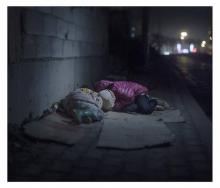
All of us are understandably sad about Paris — devastated. Many people have used striped profile pictures, candles, and flowers to express our collective solidarity. But in the wake of tragedy, almost half of the governors of the U.S. have responded with fear, announcing that they will do whatever they can to thwart the acceptance of Syrian refugees — from cutting funding for nonprofit resettlement agencies, to demanding religious screening tests.
If there’s one thing I learned from some of my friends who are refugees, it’s how to respond to grief. And there’s no one approach and they didn’t always get it right. But sometimes they did: Some refugees, in the shadow of shocking sadness, sang more than usual, prayed louder, invited more friends over for dinner, cooked their parent’s recipes. None of them responded with terrorism.
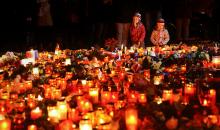
From a religious perspective, the hardest thing about confronting evil is the painful human tendency to only see it in others, in our enemies, and not see any on our side because of the blurred vision caused by the specks in our own eyes, to paraphrase the gospels. In discussing ISIS, we should clearly use the language of sin — the enormous sin of the ideological hate of ISIS finding its victims all over the world.
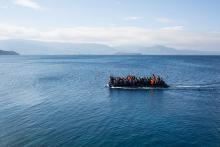
French president François Hollande announced on Nov. 18 that France will continue to resettle refugees.
Over the next two years, Hollande said that France would welcome 30,000 refugees from Syria and Afghanistan, among others. This is even more than his September commitment of 24,000.
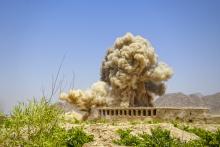
The joint statement — from the group who have experience of operating drones over Afghanistan, Iraq and other conflict zones — represents a public outcry from what is understood to be the largest collection of drone whistleblowers in the history of the program. Three of the letter writers were sensor operators who controlled the powerful visual equipment on U.S. Predator drones that guide Hellfire missiles to their targets.
…The four are represented legally by Jesselyn Radack, director of national security and human rights at the nonprofit ExposeFacts. “This is the first time we’ve had so many people speaking out together about the drone program,” she said, pointing out that the men were fully aware that they faced possible prosecution for speaking out.

I’ve thought about this obedience to vulnerability in light of the current conversation our nation has been having about the refugee crisis, in particular since the attacks in Paris this weekend. The fearful calls to close our border have been disheartening, especially as we begin to enter the season of Advent. Jesus, as God incarnate, saw our sin and flaws and darkness — our hostility even — to the Light and still made himself vulnerable to live among us and die at our hand. Through the cross he offered a generous hospitality to us while we were still enemies of God — a feast of himself, for us to taste and see that God is good.
It should not be any different for us as followers of Christ. As any Christian knows, being part of the Body of Christ is often a dangerous proposition. We are in danger of getting hurt any time we come into contact with another person. We will sin against each other, we will experience conflict, and if we’re doing it right, we’ll bear each other’s suffering. We are knit together with people we may not typically associate, people who view the world in ways we may find misguided at best and dangerous at worst. It doesn’t matter — we’re still invited to the same feast and we’re still joined together in the same family, drinking out of the same cup the way family members and close friends do.

Q: Al-Qaida is al-Qaida. Hamas is Hamas. But the Islamic State can be “ISIS,” “ISIL,” and “Daesh.” Why so many names?
A: Put the group’s Arabic name into the translation machine, and you get different renderings in English.
The first part of the original name — Dawlat al-Islamiyah f’al-Iraq w Belaad al-Sham — is straightforward: “Islamic State in Iraq.” But you’ve got some room for disagreement on “Sham,” which can be “Syria” or “Greater Syria” or “the Levant.” Go with “Syria” and the acronym becomes “ISIS.” If you choose “Levant,” your acronym is “ISIL.”
You could also say the “Islamic State,” the name the group now prefers. But many call that wrongheaded or offensive or both. It is not a state. And there is nothing Islamic about it, said Imam Sayyid M. Syeed of the Islamic Society of North America.
“It’s misusing the name of Islam in such an ugly way,” he said.

I’ve heard it said that you don’t know true love until you hold your baby for the first time. I hate that, for so many reasons. And I hate whoever has said it to me or anyone else. Hate it.
This may come as a shock, but I’ve got the slightest anger issue. It’s more accurate to say I didn’t know true anger until I became a mother.
There’s the daily anger, like slaving away in the kitchen for hours only to have people gag and demand crunchy toast and cookies to eat, while they scream and scratch their sister and slip on spilled water and cry for hours. There’s the hourly anger, like the struggle between wanting to check out and check e-mail in the face of little people wanting to play or needing to be disciplined.
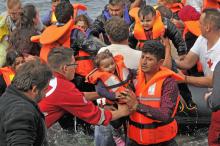
Whether you like it or not, Christians are called to help the world’s most abused, hurt, helpless, exploited, and destitute.
If you’re a follower of Christ passionate about social justice, of if you attend a church that claims to be enthusiastic about global missions, or if you’re part of a Christian organization that facilitates ministry, you’ve been handed a golden opportunity — the ability to minister to millions of people in desperate need.
This is a chance to be radically countercultural — to glorify Christ through selfless sacrifice, hospitality, and love. Being a Christ-follower isn’t easy, and it will require hard work, but it’s worth it.

"The people who are fleeing Syria are the most harmed by terrorism, they are the most vulnerable as a consequence of civil war and strife. They are parents, they are children, they are orphans. And it is very important — and I was glad to see that this was affirmed again and again by the G20 — that we do not close our hearts to these victims of such violence and somehow start equating the issue of refugees with the issue of terrorism.
"When Pope Francis came to visit the United States, and gave a speech before Congress, he didn’t just speak about Christians who were being persecuted. He didn’t call on Catholic parishes just to admit to those who were of the same religious faith. He said, protect people who are vulnerable."
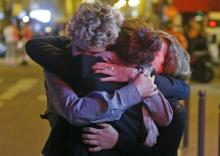
Pope Francis raised the specter of a World War III “in pieces,” Muslims issued statements of condemnation, while evangelical Christians in America debated whether to speak of a “war with Islam.”
These were some of the responses by religious leaders around the world on Nov. 14 to the series of attacks overnight in Paris which left more than 120 people dead.
“This is not human,” Francis said phone call to an Italian Catholic television station. Asked by the interviewer if it was part of a “Third World War in pieces,” he responded: “This is a piece. There is no justification for such things.”
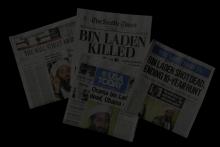
Displayed over a blurred image of Osama bin Laden, the headline on the cover of The New York Times Magazine for October 18 reads, “Do we really know the truth about his death? The mysteries of Attobad.”
Weirdly, the article is not an investigation of the truth about bin Laden’s death — it’s an investigation of other investigations. Jonathan Mahler decided to report on two competing narratives about the raid in Abbottabad. His article is a soul-searching reflection on how we can know which version of events is true, or if the truth about our government’s actions can ever be known at all.
After reading his article, it’s fair to wonder if we ever will. If our concern is to learn the facts of the raid, we may easily get lost in a tangle of facts and lies. But that is a truth in itself — a truth of how violence works to destroy the truth.
We need to state the obvious here: the subject of all this reporting is a death by violence. The subject of this story is not the truth. The subject is violence itself.

Our class studying terrorism found itself under terrorist attack.
You might expect these military men would be first in line calling for the use of force. You would be wrong. Veterans of the first Iraq war, they, like Gen. Colin Powell, warned that starting a war would be easy, but accomplishing anything good by the use of force in the region would be hard. Military attacks would "rearrange the rubble" and incite retribution and further cycles of violence. They urged other responses — political engagement, diplomacy, [and] legal and financial instruments.
As advisors to the U.S. Catholic Bishops, we also urged using “just peace” methods. Pope — now Saint — John Paul II urged President Bush not to invade Iraq but to pursue a just peace. The U.S. invasion would de-stabilize the entire region, cause worse bloodshed, and do more harm than good.
Today, as then, the military and religious leaders agree. We ought to notice.
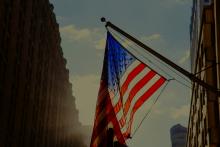
My friends and colleagues are generally aware that before I began working at Sojourners, I was a patent examiner at the U.S. Patent and Trademark Office (USPTO) for six and a half years. What most of them do not know, however, is that I interviewed for that job — a five-minute drive from the Pentagon — on September 11, 2001.
Early that morning, I decided to take the Metro rather than drive to the USPTO’s offices in Crystal City, Va. I reasoned that if I got the job, I would want to get some idea about my future daily commute. This would prove to be a fortunate decision later on.
Even before the end of my trip to Crystal City, I had already heard news of the first World Trade Center tower being hit. When I arrived at the office, I hoped the interviewer would remember me after our conversation. He did — but considering the significance of all that happened that day, my concerns about employment now seem minuscule in hindsight.
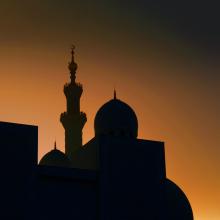
Extremist groups like ISIS and Al Qaida are trying to radicalize young Muslims through well-produced and elaborate online videos and sweeping Twitter campaigns targeted at disaffected young men and women around the world.
Three London school girls recently ran away to join ISIS in Syria after encountering recruiters on Twitter. A Sunday school teacher in Washington state secretly converted to Islam and planned to leave home to join the only Muslims she knew — Isis recruiters she encountered through social media. In Virginia, a local imam meets with young men and women whose families fear they will answer the call of ISIS sent through their cellphones.
As one member of the local law enforcement told our group of 17 international journalists, “There is a terrorist in your pocket and it is talking to you all the time.”
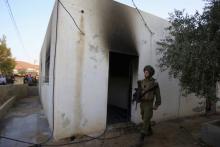
Elhanan Shmidov views this illegal Jewish outpost, within earshot of the drumming ceremonies of nearby Palestinian villages, as the epitome of "self-sacrifice," where "good Jews" like him carry out the holy mission of populating this contested land.
Shmidov, like many of his neighbors, said residents must defend their place in communities like his throughout "Judea and Samaria," the biblical name referring to land that was once the domain of the ancient Jewish kingdom. He takes no responsibility for the Jewish extremists — whom he calls "wild weeds" within the pro-settler community — who carry out violence against Palestinians.
The increasingly radical Jewish militants who target Palestinians are the latest front in Israel’s struggle against terrorism. Israeli security authorities estimate hundreds belong to the extremist groups, but only about 100 have been involved in the violent attacks.